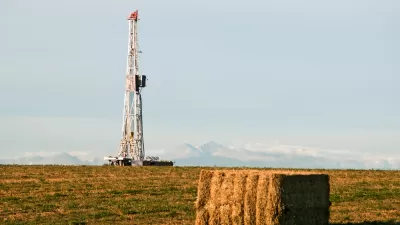Despite only applying to Federal lands where a small amount of fracking takes place, energy companies are strongly opposed, perhaps fearing that states without fracking rules could adopt them, which is one of the goals of the Interior Department.
The trade groups [Independent Petroleum Association of America and Western Energy Alliance] said the new rules are a “reaction to unsubstantiated concerns” and should be thrown out. Interior Department officials said they expect the rules to withstand challenges. [See IPAA's press release].
While only 11 percent of gas and 5 percent of oil fracking takes place on federal, including tribal lands, according to Harder and Gilbert, "states and companies could move to bring their practices in line with the U.S. (rules)." Major "energy-producing states such as Colorado, North Dakota, Pennsylvania and Texas regulate fracking already, there have been no overarching standards."
For environmental groups, the limited disclosure of chemicals used in the fracking process was disappointing. Rather than disclosure to the Interior Department where they would be accessible to the public, "the new rules require companies to publicly disclose chemicals they use through an industry-run website called FracFocus within 30 days of completing the fracking process," write Harder and Gilbert.
“While this proposal has improved from previous versions, it represents a missed opportunity to set a high bar for protections that would truly increase transparency and reduce the impacts,” said Madeleine Foote, legislative representative for the League of Conservation Voters. [See their press release].
Amy Harder explains the new rules in a one-on-one interview with PBS NewsHour's Hari Sreenivasan on Friday's show.
Correspondent's note: Subscriber-only content to The Wall Street Journal article may be available to non-subscribers for up to seven days after March 21.
FULL STORY: Fracking Rules Unveiled by Obama Administration

Planetizen Federal Action Tracker
A weekly monitor of how Trump’s orders and actions are impacting planners and planning in America.

Chicago’s Ghost Rails
Just beneath the surface of the modern city lie the remnants of its expansive early 20th-century streetcar system.

San Antonio and Austin are Fusing Into one Massive Megaregion
The region spanning the two central Texas cities is growing fast, posing challenges for local infrastructure and water supplies.

Since Zion's Shuttles Went Electric “The Smog is Gone”
Visitors to Zion National Park can enjoy the canyon via the nation’s first fully electric park shuttle system.

Trump Distributing DOT Safety Funds at 1/10 Rate of Biden
Funds for Safe Streets and other transportation safety and equity programs are being held up by administrative reviews and conflicts with the Trump administration’s priorities.

German Cities Subsidize Taxis for Women Amid Wave of Violence
Free or low-cost taxi rides can help women navigate cities more safely, but critics say the programs don't address the root causes of violence against women.
Urban Design for Planners 1: Software Tools
This six-course series explores essential urban design concepts using open source software and equips planners with the tools they need to participate fully in the urban design process.
Planning for Universal Design
Learn the tools for implementing Universal Design in planning regulations.
planning NEXT
Appalachian Highlands Housing Partners
Mpact (founded as Rail~Volution)
City of Camden Redevelopment Agency
City of Astoria
City of Portland
City of Laramie



























